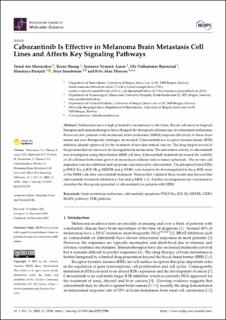Cabozantinib is effective in melanoma brain metastasis cell lines and affects key signaling pathways
Mannsåker, Trond Are; Hoang, Tuyen; Aasen, Synnøve Nymark; Bjørnstad, Ole Vidhammer; Parajuli, Himalaya; Sundstrøm, Terje; Thorsen, Frits
Journal article, Peer reviewed
Published version

Åpne
Permanent lenke
https://hdl.handle.net/11250/2832023Utgivelsesdato
2021-11-14Metadata
Vis full innførselSamlinger
- Department of Biomedicine [708]
- Registrations from Cristin [9489]
Originalversjon
International Journal of Molecular Sciences. 2021, 22 (22), 12296. 10.3390/ijms222212296Sammendrag
Melanomas have a high potential to metastasize to the brain. Recent advances in targeted therapies and immunotherapies have changed the therapeutical landscape of extracranial melanomas. However, few patients with melanoma brain metastasis (MBM) respond effectively to these treatments and new therapeutic strategies are needed. Cabozantinib is a receptor tyrosine kinase (RTK) inhibitor, already approved for the treatment of non-skin-related cancers. The drug targets several of the proteins that are known to be dysregulated in melanomas. The anti-tumor activity of cabozantinib was investigated using three human MBM cell lines. Cabozantinib treatment decreased the viability of all cell lines both when grown in monolayer cultures and as tumor spheroids. The in vitro cell migration was also inhibited and apoptosis was induced by cabozantinib. The phosphorylated RTKs p-PDGF-Rα, p-IGF-1R, p-MERTK and p-DDR1 were found to be downregulated in the p-RTK array of the MBM cells after cabozantinib treatment. Western blot validated these results and showed that cabozantinib treatment inhibited p-Akt and p-MEK 1/2. Further investigations are warranted to elucidate the therapeutic potential of cabozantinib for patients with MBM.
